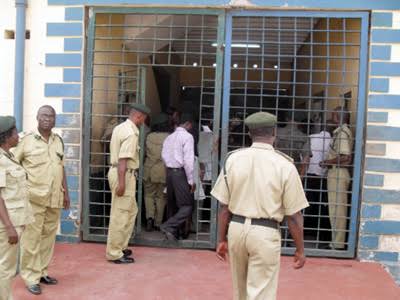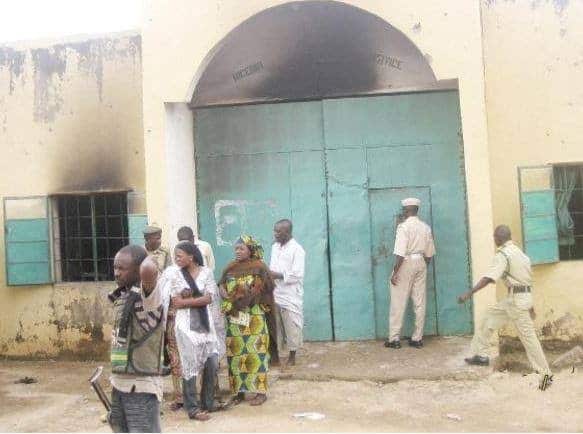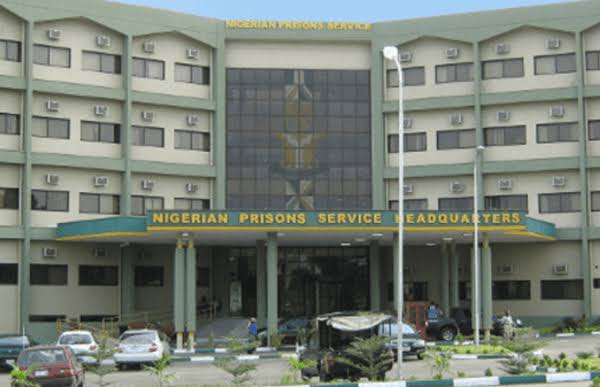In June, 2020, Solomon Samuel, an electrician was wrongfully arrested during an unprofessional raid by police personnel attached to the disbanded Special Anti-Robbery Squad (SARS) in Ikeja, Lagos.
The police later arraigned him before a Magistrate Court with the offence of “belonging to an unlawful society and being a disorderly person.”
Even though the Court granted him bail, he was left to suffer in prison because he could not meet his bail conditions.
Samuel’s case suffered several adjournments due to COVID-19 outbreak and failure of the prosecutors to bring the defendant to court.
During his time in prison, he was driven to another High Court to appear as the defendant in an unrelated case of s3xual assault.
He was, however, lucky to meet Headfort Foundation’s lawyers who took over the case on Feb. 20, 2021.
Even when the Magistrate Court struck out his first case on Dec. 20, 2021, due to lack of diligence from the police, he was still in detention because of the High Court matter.
By Feb. 4, 2022, the Court discovered that his trial for s3xual assault was a case of mistaken identity. Two years after unlawful detention, Samuel was released.
Samuel is one of many innocent Nigerians rotting in different correctional centres.
The data
While Nigeria’s prison facilities have the capacity to hold 50,083 inmates, there are about 70,056 inmates in various facilities.

Among all of these, only 19,234 have been convicted. There are no fewer than two inmates occupying the space intended for one person in all prisons.
Interior Minister Rauf Aregbesola in 2021, asked state governments to work with the federal government in addressing the challenges as an overwhelming majority of inmates in custody are state offenders.
Battabox understands that prison congestion affects inmates’ physical and mental well-being. To feed the prisoners, Nigeria spends N7.6 billion annually on awaiting trial inmates alone as about N450 is spent daily on each inmate, amounting to N21.3 million daily.
Meanwhile, there have been a series of unlawful decongestion of correctional facilities by terrorists, paving ways for thousands of inmates, including condemned criminals to escape
While the federal government in November 2021 said it has captured the biometric data of all inmates in Nigerian correctional centres, and would help to rearrest them in the case of escape, there are huge gaps left behind.
Reacting to Kuje jail break last year, President Muhammadu Buhari said he was “disappointed with the intelligence system. How can terrorists organise, have weapons, attack a security installation and get away with it? I am expecting a comprehensive report on this shocking incident.”

Senate President Ahmed Lawan also expressed shock over the lack of Closed-Circuit Television (CCTV) devices at the prison.
“How on earth does a centre of this magnitude in the FCT not have any CCTV? It means we can say that all other medium security custodial centres across the country do not have CCTV”, he wondered.
Meanwhile, 546 of Kuje escaped inmates are still at large.
Battabox also found out that only 984 of 4,369 inmates who escaped from various prisons, between 2020 and December 2021, have been rearrested.
The spokesperson of the Nigerian Correctional Service, Abubakar Umar, did not respond to calls and text messages on efforts to address the growing problem.
SEE:
- Ahmad Lawan vs. Bashir Machina: Democracy frustrates lawmakers
- INSIDE STORY: For forging secondary school certificate, Governor Adeleke risks losing at appeal court
- Problems With The New Naira Design
More accounts
Another victim of police rascality who identified himself as Mubarak, spent a year and nine months in detention for simply walking past a police van in Lagos.
The police officers who arrested him on June 23, 2020, accused him of being part of those troubling the community.
To his surprise, he was charged to court for the offence of conspiracy and cultism, and subsequently remanded.
After years of attempts to get her son released, Mubarak’s mother came in contact with Headfort Foundation at their Ebute-Metta office in September 2021. The case was assigned to a lawyer and they were able to secure his release on Wednesday, March 30, 2022.
For Emeka, a commercial tricycle rider, police arrested him during a raid on Jan. 7, 2020 in Orile area of Lagos. Since he could not pay for his bail at the station he was arraigned for the charge of stealing and cultism on Jan. 29, 2020.
Though the court granted him bail, he was unable to meet the conditions because he had no lawyer. Like many matters during Covid-19 pandemic and judicial workers’ strike, Emeka’s case was adjourned on several occasions.
He was, however, fortunate to meet Headfort Foundation lawyer at the Ogba Magistrate Court on Jan. 12, 2021.
Emeka could not regain freedom until he had spent a year and six months in Kirikiri Correctional Centre. The court struck out his case and he was discharged on July 29, 2021 for lack of diligent prosecution.
These among others are some of the cases that have been handled by the organisasion.

Speaking with our reporter, Itunuoluwa Awolu, the communication’s manager of Headfort Foundation, said the criminal justice system is not smooth enough for indigent inmates, especially those in wrongful detention.
Growing menace
The police in Nigeria have a history of carrying out unlawful arrests of innocent civilians.
The security force and the judiciary, according to Transparency International (TI) are among the top five most corrupt institutions in Nigeria.
The ranking comes after testimonies of multiple citizens who have, in the past, been victims of these institutions.
While Nigeria is a signatory to the United Nations Treaty Against Torture and Other Cruel, Inhuman or Degrading Treatment or Punishment, adopted in 1975, the police in Nigeria are notorious for injustice as accused persons are often forced to sign confessional statements.




